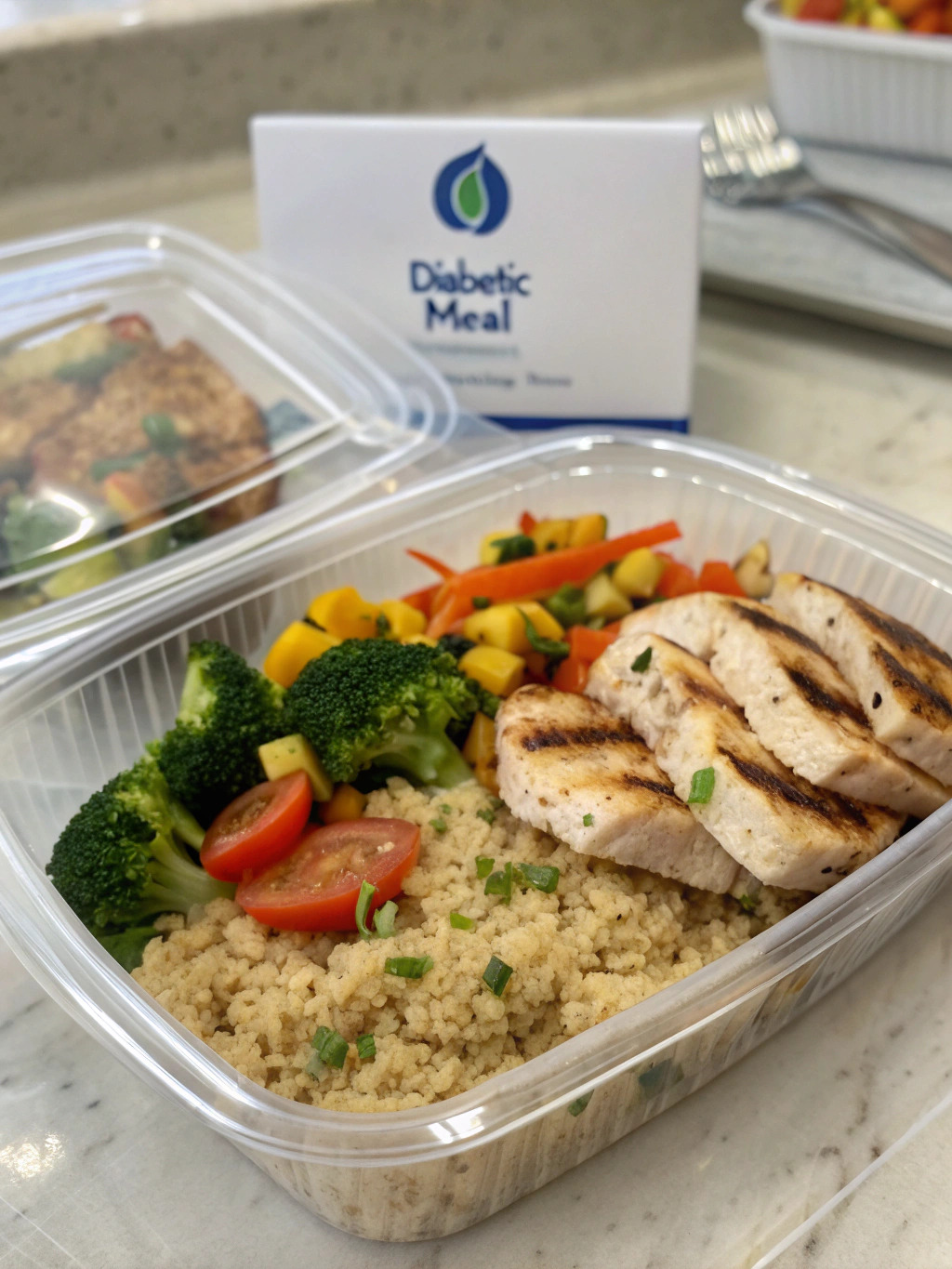Table of Contents
Introduction
Did you know that 34.2 million Americans about 1 in 10 are living with diabetes, yet 45% report struggling to consistently prepare healthy meals that align with their dietary needs? Managing diabetes while juggling a busy lifestyle can feel like an impossible balancing act. That’s where diabetic meals delivered directly to your doorstep can be a game-changer. These chef-prepared, portion-controlled meals eliminate guesswork, save precious time, and provide the peace of mind that comes with knowing every bite supports your health goals. Let’s explore how these convenient meal solutions are revolutionizing diabetes management through nutrition.
Ingredients List

The beauty of diabetic meal delivery, home delivery meals, delivery meals, food delivery for seniors, diet food delivery, diabetic home delivery meals, healthy meal kits, meal delivery kits, meal delivery best, healthy prepared meals delivered services is their commitment to high-quality, diabetes-friendly ingredients:
- Lean proteins (chicken, turkey, fish, tofu)
- Low-glycemic carbohydrates (quinoa, brown rice, sweet potatoes)
- Fiber-rich vegetables (broccoli, spinach, bell peppers)
- Heart-healthy fats (olive oil, avocado, nuts)
- Minimal added sugars and sodium
- Fresh herbs and spices for flavor without extra calories
Many services also offer substitution options for common allergens like dairy, gluten, or nuts, making personalization simple regardless of your specific dietary needs.
Timing
One of the most significant advantages of diabetic meal delivery services is the tremendous time savings they offer:
- Meal selection time: 15-20 minutes weekly (compared to 2+ hours planning traditional meals)
- Preparation time: 2-3 minutes (93% less time than cooking from scratch)
- Cooking time: Typically 2-5 minutes in microwave or 15-20 minutes in conventional oven
- Total weekly food prep time: Under 30 minutes (compared to national average of 6.1 hours)
This efficiency translates to approximately 5.5 hours saved weekly time you can invest in other important aspects of diabetes management like exercise or self-care.
Step-by-Step Instructions
Step 1: Choose Your Service
Research diabetic-friendly meal delivery services that specifically cater to low-glycemic needs. Look for companies that employ registered dietitians and disclose complete nutritional information, including carbohydrate counts and glycemic impact.
Step 2: Customize Your Meal Plan
Most services allow you to select meals based on your preferences, dietary restrictions, and health goals. Take advantage of filtering options to choose meals that align with your specific carbohydrate targets and taste preferences.
Step 3: Schedule Your Delivery
Determine your ideal delivery frequency weekly, bi-weekly, or monthly. Many services offer flexible scheduling, allowing you to pause or modify deliveries around travel or special events.
Step 4: Proper Storage Upon Receipt
When your meals arrive, immediately check that packaging is intact. Store refrigerated meals at or below 40°F, and keep frozen meals at 0°F or below to maintain safety and quality.
Step 5: Heat and Enjoy
Follow the specific heating instructions provided with your meals. Most require minimal preparation typically 2-5 minutes in a microwave or 15-20 minutes in a conventional oven.
Nutritional Information
Quality diabetic meal delivery services provide comprehensive nutritional transparency:
- Controlled carbohydrate content (typically 30-45g per meal)
- Balanced macronutrient distribution (50% carbs, 25% protein, 25% healthy fats)
- Moderate sodium levels (under 600mg per serving)
- Adequate fiber (5-8g per meal) to slow glucose absorption
- Complete micronutrient profiles, particularly rich in chromium, magnesium, and potassium
- Calorie-controlled portions (typically 350-500 calories per meal)
Studies show that consistent consumption of nutritionally balanced meals can help reduce HbA1c levels by 0.5-1.0% over three months.
Healthier Alternatives for the Recipe
Even with pre-prepared meals, you can further customize for your needs:
- Add extra non-starchy vegetables to increase fiber and volume
- Incorporate a side salad with olive oil and vinegar to lower the overall glycemic load
- Divide higher-carb meals into two portions and supplement with additional protein
- Add a sprinkle of cinnamon to carb-containing dishes, as research suggests it may help stabilize blood sugar
These simple modifications allow you to adapt delivered meals to your specific blood glucose patterns and needs.
Serving Suggestions
Elevate your delivered meals with these diabetic-friendly accompaniments:
- Pair protein-focused meals with a small side of berries (lowest glycemic fruit option)
- Add a tablespoon of nuts or seeds for extra crunch and healthy fats
- Include a small side of fermented foods like kimchi or sauerkraut for gut health
- Serve with a warming cup of unsweetened tea with cinnamon or ginger for digestive benefits
Remember to log your complete meal in your blood glucose management system to track impacts accurately.
Common Mistakes to Avoid
When utilizing diabetic meal delivery services, be mindful of these potential pitfalls:
- Assuming all meals are automatically appropriate for your specific needs (always check nutritional info)
- Neglecting to monitor blood glucose response to new meals
- Overlooking sodium content, which can be elevated in some preserved meals
- Forgetting to stay hydrated alongside your meals
- Adding high-glycemic sides or condiments that can spike blood sugar
According to a 2022 survey, 67% of diabetic meal delivery users report better glucose control when they actively review nutritional information and monitor their body’s response.
Storing Tips for the Recipe
Maximize the longevity and quality of your delivered meals with these storage practices:
- Keep meals in their original packaging until ready to heat
- Store meals in the coldest part of your refrigerator (usually the back)
- Freeze any meals you won’t consume within 3-4 days
- Label meals with receipt and “use by” dates for easy rotation
- Never refreeze previously thawed meals
Proper storage ensures food safety while preserving nutritional integrity particularly important for temperature-sensitive nutrients like vitamin C and B vitamins.
Conclusion
Diabetic meals delivered to your door represent more than mere convenience they’re a powerful tool for consistent diabetes management through nutrition. By eliminating the barriers of shopping, planning, and preparing diabetes-friendly meals, these services help you maintain dietary consistency while saving valuable time and mental energy. The combination of nutritional precision, portion control, and convenience creates a sustainable approach to healthy eating that can significantly impact your overall health outcomes. Why not give your health and your schedule the gift of simplicity by trying a diabetic meal delivery service this week?
FAQs
How do diabetic meal delivery services determine appropriate carbohydrate levels?
Most services work with registered dietitians who follow American Diabetes Association guidelines, which generally recommend 45-60g of carbohydrates per meal for most adults with diabetes. However, individualization is key, so look for services offering various carbohydrate levels.
Are delivered diabetic meals cost-effective compared to grocery shopping?
While the per-meal cost is typically higher than home cooking (averaging $8-12 per meal), many users report overall savings when factoring in reduced food waste, fewer restaurant meals, and the health benefits of consistent nutrition. Some insurance plans and Medicare Advantage programs now offer coverage or discounts for therapeutic meal delivery.
How fresh are delivered diabetic meals?
This varies by service. Some use flash-freezing techniques to preserve freshness, while others deliver refrigerated meals with 3-7 day shelf lives. Fresh-delivery services typically use modified atmosphere packaging to maintain quality without preservatives.
Can meal delivery services accommodate multiple dietary restrictions beyond diabetes?
Yes, most premium services offer customization for multiple needs such as gluten-free, dairy-free, low-sodium, or vegetarian diets in addition to diabetic-friendly formulations.
Will meal delivery services help me lose weight while managing my diabetes?
Many users report weight loss due to the portion control and balanced nutrition these meals provide. Research indicates that structured meal plans can lead to 2-3 times greater weight loss compared to self-directed diet plans.
Did you try our recipe ?
There are no reviews yet. Be the first one to write one.

